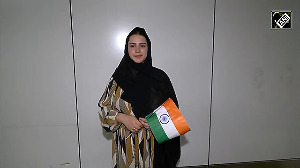India, the largest contributor to the United Nation peacekeepers, has stressed on the need to ensure missions are made relevant to current realities and peacekeepers are not tasked with achieving 'Christmas tree-like' mandates.
"As the nature of threats to international peace and security has changed over decades, so have the challenges facing peacekeeping missions," Vinay Kumar, Charge d'Affaires at the Indian mission here said in his remarks at the UN Security Council briefing on UN Peacekeeping Operations.
Kumar said peacekeeping missions today are not deployed to keep peace between states, but within states.
They have to keep peace not between two conventional armies, but deal with threats posed by armed groups, where it is not easy to distinguish a combatant from a civilian.
"The peacekeeping missions today are tasked with mandates that have been compared with Christmas tree. Peacekeepers are asked to achieve what many of us as States have struggled for decades, if not centuries, to implement, even while resource gap continues to be the singular reality that constraints the reach and ambit of peacekeeping operations.
"We therefore have to keep in mind that provision of resources, in man and in material, commensurate with the mandates is necessary not only for the operational effectiveness of peacekeeping missions but will also have a direct bearing on the credibility of this Council's mandates," he said.
Kumar said under the current circumstances, the rules of engagement and concepts of operations have to be adjusted to suit the particular circumstances prevailing in the host countries since no one size would fit all situations.
He said several UN peacekeeping mandates have included tasks that raise questions on the fundamental tenet of consent, placing peacekeepers in difficult legal circumstances.
"UN peacekeeping is truly a unique enterprise that involves global burden sharing.... Protection of civilians to a life of dignity, security, and opportunity is indeed a task that deserves much more than what the international community has committed thus far.
"Leaving it to the hands of peacekeeper alone remains a half measure at best," he said.
As the largest contributor of peacekeepers in the UN's history, India is conscious that much has changed since the first peacekeeping missions were launched more than five decades ago.
"The challenge before us is to build upon the legacy of peacekeeping and to ensure its relevance to current realities. We must remind ourselves that it is a small cost in front of the noble goals we have set ourselves to achieve," he said.
The capacity of nations to effectively implement the mandates of UN missions would depend on provision of adequate resources, rational mandate generation and sourcing of expertise from countries having experience most relevant for the conditions in which peacekeepers are deployed.
While preserving and supervising peace agreements and restoring basic governance are peacekeeping's chief accomplishments, tasks ranging from law and order and the rule of law to national institution building cannot be entrusted to the military components alone.
"Strategies must be devised with sufficient details, resources, and implementation plans to address each phase of peace process," he said.







